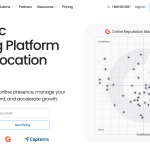In today’s fast-paced business landscape, innovation is the name of the game. Companies are constantly on the lookout for tools that can help them stay ahead of the curve. Enter generative AI—a technology that’s not just transforming how we think about creativity and problem-solving but also revolutionizing productivity in ways we never imagined possible.
Imagine having a virtual assistant that can generate ideas, write content, analyze data, and even design products—all tailored to your specific needs. This isn’t science fiction; it’s happening right now. As businesses embrace this powerful tool, they discover new avenues for growth and efficiency.
Whether you’re a startup looking to carve out your niche or an established corporation aiming to streamline operations, generative AI has something to offer everyone. Let’s delve into what it is, where it’s being applied in business today, and why it could be the catalyst for your next big breakthrough.
Understanding Generative AI
Generative AI refers to algorithms that can create new content, from text and images to music and designs. Unlike traditional AI, which analyzes existing data for patterns, generative AI learns from vast datasets to produce original outputs.
At its core, this technology uses advanced neural networks. These systems mimic the way humans learn but on a much larger scale. Through training on diverse information sources, they develop an understanding of context and style.
The result? Machines are capable of generating ideas or concepts that feel remarkably human-like. This capability opens doors for creativity in ways previously thought impossible.
As businesses explore its potential, they find applications ranging from automating marketing copy to developing unique product designs. The versatility of generative AI is reshaping industries by enhancing both efficiency and innovation at every level.
Applications of Generative AI in Business
Generative AI development services are reshaping numerous business sectors. Its capability to analyze vast datasets enables personalized marketing strategies. Businesses can create tailored content, improving customer engagement.
In product design, generative AI assists in creating prototypes with innovative features. It analyzes user feedback and designs solutions that are both functional and appealing.
Human resources benefit too. Recruitment processes become more efficient as AI screens resumes and identifies top candidates based on specific criteria.
Customer service sees significant enhancements through chatbots powered by generative AI. These intelligent bots provide instant responses, ensuring a seamless experience for users.
Additionally, financial forecasting leverages this technology to predict market trends accurately. By analyzing historical data, companies make informed decisions about investments and resource allocation.
The creative industry also embraces generative AI for art and music production, opening new avenues for creators while pushing the boundaries of traditional forms of expression.
The Benefits of Using Generative AI in Business
Generative AI revolutionizes business operations by enhancing efficiency and creativity. It automates repetitive tasks, allowing employees to focus on strategic projects that drive growth.
This technology can generate content, design prototypes, and even suggest marketing strategies, saving valuable time. Companies benefit from faster turnaround times without sacrificing quality.
Moreover, it fosters innovation. By analyzing vast amounts of data, generative AI uncovers trends and insights that humans might overlook. This leads to informed decision-making and the development of unique solutions.
Cost reduction is another significant advantage. Businesses see decreased operational costs as they streamline processes with automation and data analysis capabilities.
Enhanced customer experiences arise through personalized interactions powered by generative AI-driven recommendations tailored to individual preferences. The potential for improved engagement is substantial in today’s competitive landscape.
Potential Challenges and Limitations of Generative AI for Business
Generative AI brings numerous advantages, but it’s not without its hurdles. One major concern is the quality of output. Sometimes, the generated content lacks coherence or relevance to the task at hand.
Data dependency poses another challenge. Generative models rely heavily on large datasets for training. If these datasets contain biases, the AI can inadvertently perpetuate those biases in its outputs.
Security and privacy issues also emerge with generative technologies. Sensitive data might be exposed during training, leading to potential breaches.
Moreover, there’s a learning curve associated with integrating this technology into existing workflows. Employees may require training to effectively harness its capabilities.
Ethical considerations loom large. The use of generative AI raises questions about authorship and accountability that businesses must navigate carefully as they adopt these tools into their operations.
The Future of Generative AI and its Impact on the Business World
The future of generative AI is a canvas painted with possibilities. As technology advances, we can expect even more sophisticated algorithms that will redefine creativity and efficiency in business.
Imagine real-time content generation tailored to customer preferences. Personalized marketing campaigns could become the norm, enhancing customer engagement while saving time and resources.
Collaboration between human ingenuity and AI will foster unprecedented innovation. Businesses can leverage these tools to brainstorm ideas or develop prototypes at lightning speed.
However, ethical considerations will be paramount. Companies must navigate data privacy concerns while ensuring transparency in AI-generated outcomes.
As generative AI evolves, so too will its ability to analyze vast amounts of information quickly. This capability may lead organizations to make smarter decisions based on predictive insights rather than relying solely on historical data alone.
In this dynamic landscape, adaptability becomes essential for businesses aiming for success in an increasingly competitive environment driven by technological advancements.
Conclusion
Generative AI is reshaping the business landscape. Its ability to create, analyze, and optimize processes offers remarkable opportunities for growth. Companies that embrace these technologies can enhance productivity, streamline workflows, and foster innovation.
The applications of generative AI are vast. From content creation to product design, businesses are finding new ways to harness its potential. Early adopters are already reaping the rewards, driving them ahead of competitors who hesitate.
However, challenges remain. Concerns about data privacy and ethical implications need addressing as organizations integrate this technology into their operations. Understanding these nuances will be crucial for sustainable adoption.
As we look ahead, generative AI promises to evolve further. Its impact on industries will likely grow stronger with advancements in machine learning and natural language processing. Those willing to adapt could find themselves at the forefront of a new era in business strategy and efficiency.
Organizations must stay informed about developments in this field while carefully considering how best to leverage generative AI capabilities within their unique contexts. The future holds endless possibilities for those ready to engage with this transformative technology.
Lynn Martelli is an editor at Readability. She received her MFA in Creative Writing from Antioch University and has worked as an editor for over 10 years. Lynn has edited a wide variety of books, including fiction, non-fiction, memoirs, and more. In her free time, Lynn enjoys reading, writing, and spending time with her family and friends.















